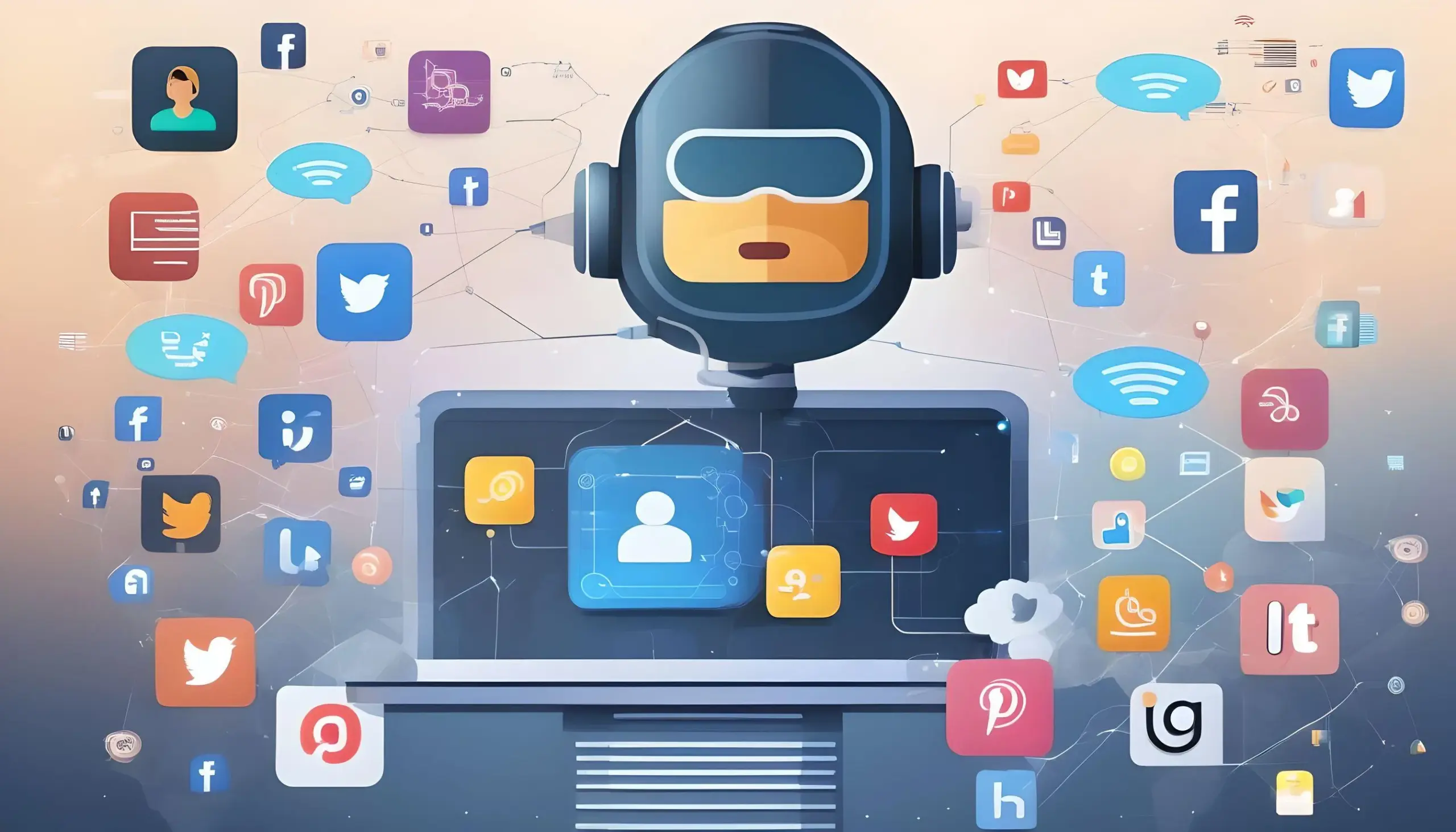Introduction to AI in Social Media Management
In today’s fast-paced digital landscape, social media management has become a crucial component of marketing strategies for businesses of all sizes. As the volume and complexity of social media tasks grow, the integration of Artificial Intelligence (AI) has emerged as a game-changer. AI-powered tools are transforming the way social media is managed and automated, offering unprecedented efficiency, precision, and engagement.
AI in social media management involves the use of machine learning algorithms, natural language processing, and data analytics to streamline various tasks. These tasks range from content scheduling and sentiment analysis to customer interaction and performance tracking. The benefits of leveraging AI-powered tools include time savings, enhanced accuracy, and the ability to derive actionable insights from vast amounts of data.
Key Features of AI-Powered Social Media Tools
AI-powered social media management tools come with a host of features designed to optimize and automate the social media workflow. Here are some of the key functionalities:
1. Content Scheduling and Publishing
One of the primary features of AI-powered social media tools is the ability to schedule and publish content across multiple platforms. These tools analyze the best times to post based on audience engagement patterns, ensuring maximum visibility and interaction. Automated scheduling also allows for a consistent posting schedule, which is essential for maintaining audience interest and engagement.
2. Sentiment Analysis
AI tools can analyze social media posts, comments, and reviews to gauge public sentiment. Sentiment analysis helps businesses understand how their audience feels about their brand, products, or services. By identifying positive, negative, or neutral sentiments, companies can tailor their responses and strategies accordingly.
3. Customer Interaction and Chatbots
AI-powered chatbots are increasingly being used for customer interaction on social media platforms. These chatbots can handle a wide range of tasks, from answering frequently asked questions to providing personalized recommendations. They operate 24/7, ensuring that customer inquiries are addressed promptly, thereby enhancing customer satisfaction and loyalty.
4. Analytics and Reporting
Advanced analytics and reporting features are integral to AI-powered social media tools. These tools track key performance metrics such as engagement rates, click-through rates, and follower growth. They also provide insights into audience demographics and behavior, helping businesses refine their social media strategies for better results.
5. Content Creation and Curation
AI tools can assist in content creation by suggesting topics, headlines, and hashtags based on trending data and audience interests. They can also curate relevant content from various sources, ensuring that social media feeds remain fresh and engaging. By automating these processes, businesses can maintain a consistent and appealing online presence.
Popular AI-Powered Social Media Tools
Several AI-powered social media management tools have gained popularity due to their robust features and benefits. Here is an overview of some of the most widely used tools:
1. Hootsuite
Hootsuite is a comprehensive social media management platform that offers powerful scheduling, monitoring, and analytics capabilities. Its AI features include predictive analysis to determine optimal posting times and sentiment analysis to track audience perceptions. Hootsuite’s intuitive dashboard makes it easy to manage multiple social media accounts from a single interface.
2. Buffer
Buffer is known for its simplicity and ease of use, making it a favorite among small businesses and startups. It provides automated scheduling, content curation, and analytics features. Buffer’s AI-powered tools analyze engagement patterns to recommend the best times to post, ensuring that content reaches the widest possible audience.
3. Sprout Social
Sprout Social combines social media management with powerful analytics and customer relationship management (CRM) features. Its AI-driven tools offer sentiment analysis, competitive benchmarking, and detailed performance reports. Sprout Social’s chatbot capabilities enable seamless customer interactions, enhancing user experience and engagement.
Benefits of Using AI for Social Media Automation
Automating social media tasks with AI offers numerous advantages, making it an indispensable tool for modern marketers:
1. Time Savings
AI-powered tools automate repetitive tasks such as scheduling posts, responding to common queries, and generating reports. This automation frees up valuable time for marketers to focus on strategic activities and creative content development.
2. Improved Engagement
By analyzing engagement patterns and audience behavior, AI tools can optimize posting schedules and content types. This ensures that posts reach the right audience at the right time, leading to higher engagement rates and increased visibility.
3. Enhanced Analytics
AI-driven analytics provide deep insights into social media performance, enabling marketers to make data-driven decisions. These insights help identify successful strategies, uncover areas for improvement, and track the effectiveness of campaigns in real-time.
4. Personalized Content
AI can analyze individual user preferences and behaviors to deliver personalized content recommendations. This personalization enhances user experience, fosters loyalty, and increases the likelihood of conversions.
Case Studies and Success Stories
Case Study 1: Starbucks
Starbucks successfully leveraged AI-powered tools to enhance its social media strategy. The company used an AI-driven platform to analyze customer feedback and sentiment on social media. This analysis helped Starbucks identify common customer concerns and preferences, allowing them to tailor their marketing messages accordingly. As a result, Starbucks saw a significant increase in customer engagement and positive brand sentiment.
Case Study 2: Netflix
Netflix is renowned for its use of AI in content personalization. By analyzing user viewing habits and preferences, Netflix’s AI algorithms recommend shows and movies tailored to individual tastes. This personalized approach extends to Netflix’s social media strategy, where AI tools help curate and promote content that resonates with different audience segments. This strategy has contributed to Netflix’s high engagement rates and customer retention.
Challenges and Considerations
While AI-powered tools offer numerous benefits, there are also challenges and considerations to keep in mind:
1. Data Privacy and Security
The use of AI involves collecting and analyzing vast amounts of user data. Ensuring data privacy and security is paramount to maintaining customer trust. Marketers must comply with data protection regulations and implement robust security measures to safeguard user information.
2. Algorithm Bias
AI algorithms can sometimes exhibit bias, leading to skewed results and unfair treatment of certain user groups. Marketers must regularly audit their AI systems for bias and take corrective actions to ensure fairness and inclusivity.
3. Over-Reliance on Automation
While automation can significantly enhance efficiency, over-reliance on AI tools can lead to a lack of human touch in social media interactions. It’s essential to strike a balance between automation and personalized engagement to maintain authentic connections with the audience.
Future Trends in AI and Social Media Management
The future of AI-powered social media management looks promising, with several emerging trends set to shape the landscape:
1. Enhanced Personalization
AI advancements will enable even more precise personalization, delivering hyper-targeted content that meets individual user needs. This will lead to higher engagement and improved customer satisfaction.
2. Voice and Visual Search
As voice and visual search technologies gain popularity, AI-powered tools will evolve to optimize social media content for these search methods. This will open new avenues for reaching and engaging audiences.
3. Integration with Augmented Reality (AR)
AI and AR integration will create immersive social media experiences, allowing users to interact with brands in innovative ways. This trend will enhance engagement and provide unique marketing opportunities.
Conclusion
AI-powered tools are revolutionizing social media management by automating tasks, enhancing engagement, and providing valuable insights. By leveraging these tools, businesses can save time, improve their social media strategies, and achieve better results. However, it’s crucial to address challenges such as data privacy, algorithm bias, and maintaining a human touch in interactions.
As AI technology continues to evolve, staying informed about emerging trends and best practices will help marketers navigate the future of social media management effectively. Embracing AI-powered tools can lead to more efficient, personalized, and impactful social media campaigns, ultimately driving business success in the digital age.







